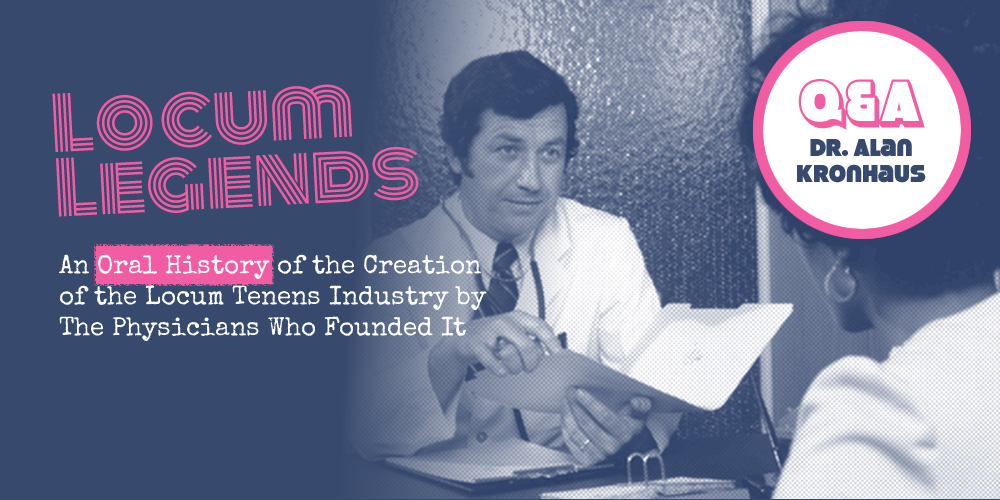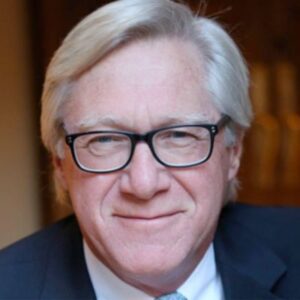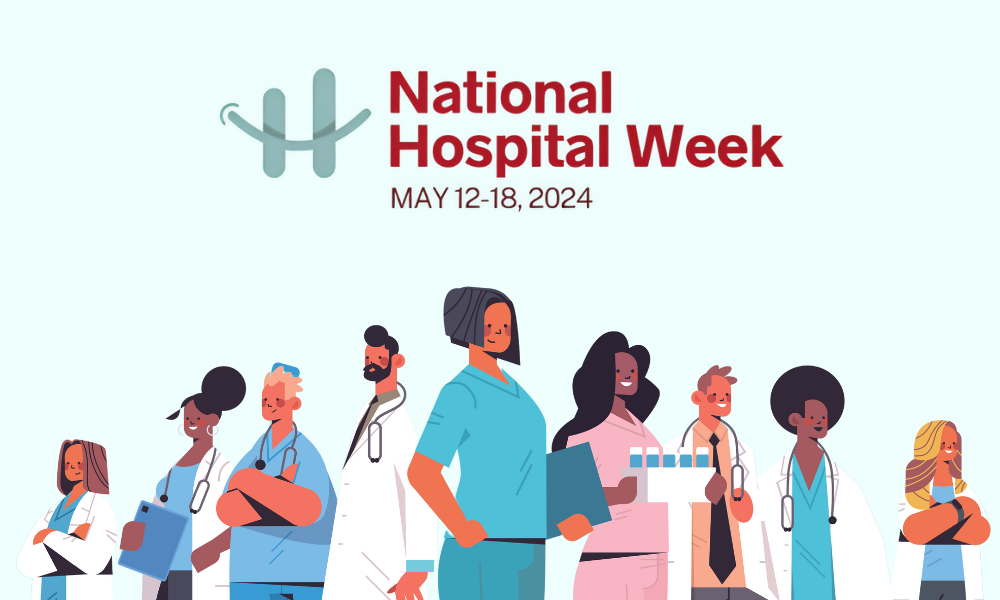As the industry celebrates the importance of temporary physicians during National Locum Tenens Week 2023, Locumpedia steps back in time to tell the untold story of how enterprising doctors and business leaders in the 1970s created a $6 billion staffing juggernaut.
These trailblazers played an instrumental role in shaping the industry during its nascent stages. Their foresight and resourcefulness revolutionized healthcare staffing, providing an invaluable service to physicians, healthcare facilities, and millions of patients over the past four decades.
In an exclusive Q&A session with Locumpedia, we had the privilege of sitting down with Dr. Alan Kronhaus, one of the industry’s founding figures.
With enthusiasm and clarity, Dr. Kronhaus takes us on an enlightening journey, recounting the challenges, triumphs, and pivotal moments that shaped the locum tenens landscape as we know it today.
He explains that the idea for locum tenens came years after the creation of the Health Systems Research Institute (HSRI), a nonprofit developed by the University of Utah to recruit temporary doctors to cover the practice of rural physicians.
Dr. Kronhaus joined HSRI after his residency ended because he was searching for short-term work to fund his winter activities, and there weren’t many options available at the time.
He returned to work at HSRI after the winter and stayed at HSRI for the next five-plus years. By destiny or fate, Dr. Kronhaus would team up with Dr. Therus Kolff at the HSRI. The two would eventually break off to form separate companies offering a specific business model we now know as locum tenens.
Locumpedia: It’s rare to have an opportunity to establish an entire industry. You saw it grow from humble beginnings to one worth billions. Can you talk about why this staffing model was conceived?
Dr. Alan Kronhaus: From my perspective as a physician and entrepreneur, this whole thing was a very focused “problem-solution” kind of thing.
I’m kind of a problem-solution type of guy. If you identify a problem in the marketplace and come up with something that addresses the issue effectively, chances are your business is going to do well by doing good.
The roots of locum tenens go back to when I was a resident at the University of Utah Medical Center. When I left residency in 1974, I mainly wanted to become a “ski bum” for one season. I had been one of these people that knew they wanted to be a doctor from the time I was in second grade. I was the classic overachiever and had skipped grades, including the 6-year medical program at Boston University.
I realized, “Gee, I need to fund that [skiing] with something.” I started hunting around for a job that would be relatively short so that by the time ski season rolled around, I could split and then ski. There were no locum tenens in those days, no shift work, and so forth, so it wasn’t easy to find a short-term job.
There was this outfit called HSRI. This organization was based at the University of Utah and had split off and become a private nonprofit. Their mission was to help underserved rural practices attract and hold good doctors. At the time, they were desperate for a physician willing to go out and go into the first community they had contracted with to find a doctor. This [community] was Battle Mountain, Nevada. We cut a deal. I would stay for three months, giving them time to find a replacement, and then I was history. So I rushed in to work for them.
HSRI pioneered a program to recruit doctors, providing funding and administrative support, allowing doctors to focus solely on practicing medicine. We later expanded, sending specialists to work with doctors for a few days. After a few months, HSRI found my replacement so I could go skiing.
After the ski season, I needed a job, and the first people I called were HSRI—to make a long story short, I wound up working for them for five years after that. I started going back into the field, then became their medical director when I got involved, and that’s when I recruited Dr. Therus Kolff to join me.
Locumpedia: Can you tell me how you knew Dr. Kolff? What did you do together at HSRI?
AK: I knew him from residency — when I was a first-year resident, he was a fourth-year medical student.
We worked at HSRI for a time, and then he split. He took time off and went around the world, which was very unusual in those days, and by the time he came back, I was ready to leave HSRI.
Over the five years I was with HSRI, the program gained traction. We managed something like 30 clinics in these small rural areas. It really contributed to overcoming the geographic maldistribution of physicians.
Locumpedia: How did this lead to the start of locum tenens services?
AK: Well, one of the key drivers for HSRI was that we would improve the conditions of rural practices. Some of the key facets are that we would fly out a specialist and invest in a community to recruit doctors. One of the most important problems associated with rural healthcare that we ran into and wanted to help with was how docs could not take time off. They weren’t just on call 24-7; it was 24/7, 365. If they left the practice, there was nobody to take their place, and it was this big guilty thing.
Anybody contemplating rural practice would be smart enough to know, “Well, how am I ever going to get some time off?” In the over five years I was involved, I had hundreds of hours in [HSRI’s] little corporate prop plane — a puddle jumper. I went to all these communities trying to sell our wares, and I would meet with county commissioners to raise money. We’d talk to docs so they weren’t threatened by us, and let them know we wanted to bring in docs to help shoulder the load.
Some of the docs loved it, but many said,” I’m not so sure about this. I don’t need much of what [services] you’re offering, and I’m unsure if I want you involved. But if you can ever find me a way to get out of here, even for two weeks, that would be great.” I kept hearing this.
As much as I believed in the HSRI model, I knew it was a tough sell. Cracks in the system were starting to form. For example, in the most successful of situations, we’d recruit a doc that would end up staying for years, and that would be great. Well, with some of the docs that we had recruited, they would get settled in, would like it, and then they would cut us out.
After going to all these communities and talking to all these docs, I finally realized that the [temporary relief] component was the most valuable to the docs. I started lobbying with the powers that be at HSRI, saying let’s tease that one element out of our comprehensive package of support services and make a business of it.
Only one person was supportive, and that was Therus.
I’m not the kind of person who accepts a no. So I set up a skunkworks operation, and I and a secretary were on the lower level of this office suite. That’s where I essentially started selling locum tenens.
Locumpedia: So locum tenens came from this one element of the HSRI that doctors were asking for?
AK: Yeah, the thing that jelled the whole idea was this: HSRI got the contract to provide medical services at Yellowstone National Park. HSRI gave me the nod to execute the entire program, which was crazy because I didn’t know anything about that.
To make that long story short, I recruited docs based on the fact that they could do it for three months. I even got doctors from the University of Utah to rotate through twice a week.
Everything worked beautifully because the doctors were willing to do it. After all, it wasn’t a lifetime commitment for them. I started to believe that I could create a job role for docs working a couple of weeks and a few months now and again.
Locumpedia: Can you take us through some of the main selling points used to recruit doctors in those early days?
AK: We didn’t have to worry about marketing. We had to worry about [contracting the] docs who would go out to places. Getting them to [do temp work] was easier than settling in Cut Bank, Montana, for an open-ended commitment. A small cohort of doctors were doing this, and it worked well. At that time, [1979] the healthcare delivery system was getting national attention.
It was a unique system and organization and a unique idea addressing the geographic maldistribution of doctors.
But I was starting to miss clinical medicine, and I met a guy who turned me on to the Robert Wood Johnson Clinical Scholars Program. Taking this job allowed me to get additional training and pursue other business aspects of medicine. In the Clinical Scholars Program, you could go anywhere in a university and meet with anyone and any type of thing as long as “you did something productive.”
Locumpedia: That sounds open-ended. So, they let you do whatever you wanted?
AK: It was great. How could you say no? I left HSRI, decamped to Chapel Hill, and became a Clinical Scholar for two years. But before I left HSRI, guess who came back from his trip? [Laughs]
Locumpedia: Right! I almost forgot about him.
AK: Therus was thinking about going back and doing more residency. We were good friends and were talking it through. And I said, “Listen, I know you’ve mixed emotions about HSRI, but I’m leaving, and it would be cool if you became the medical director.” He decided ultimately to do that. I left, he stepped in, and as predicted, the core business started getting into trouble. Therus remained a steadfast advocate. He kept nurturing it from the small cohort of doctors I developed. To expand that, he began to market the service outside.
Locumpedia: Can you tell me more about how you knew the demand for this industry was there? Where was the lightbulb moment of, “Oh, this is something we can create an industry around”?
AK: The Clinical Scholars Program was a two-year fellowship. Various universities funded 12 positions. It was a very loosey-goosey program, but they expected you to come up with a project. I decided to study this thing I’d been working on: The economics of locum tenens coverage. After some difficulty, I got Therus to agree to give me the books of the clinics where we were providing coverage. I realized that medical practice is a fixed-cost operation. If you’re a rural physician who wants to leave for a period of time, for the most part, the overhead remains. But there’s nobody there generating revenue.
The proverbial lightbulb went off. Why wouldn’t you get locum tenens coverage if it reduced the cost of your absence? I spent the first year analyzing these clinics’ books and the average revenue, and then I could see what happened when a locum tenens clinician took over. I think I have the only publication about locum tenens in an academic medical journal called “An Organized Locum Tenens Service and the Cost of Free Time for Rural Physicians.”
We realized it costs less to leave with coverage than without. After that first year, I couldn’t sit still. Working out of the spare bedroom of my home, I hired a secretary, got a computer, and we made copies of the doctor’s list from the American Medical Association (AMA) book. I would write a letter to the docs to find a doctor whose arm I could twist to send out on a locum tenens assignment. Early on, it was as much a matter of luck as anything.
The practice quickly took over the entire house, and then we moved to a proper office space.
Locumpedia: This was the origin of KRON Medical?
AK: Yes, we were potentially talking about a hell of a market. At that time, I was covering the East, and Therus was in the West. That lasted for a while, but not very long. The demand was such that there was plenty of room for both of us.
HSRI did wither on the vine, but fortunately, there were enough locum tenens providers to survive. There was enough activity to go from a skunkworks operation to an early-stage standalone thing. Therus was developing that, and that became CompHealth. My operation was KRON Medical, and it became a growing operation. If you fast forward about a decade, Therus’ and my operation thrived. Because we were thriving, other individuals started to move into the space.
Therus and I started to talk about, “Hey, why don’t we combine forces instead of fighting each other?” It made so much sense because we were still such good friends. About 18 months before we reached an agreement for them [CompHealth] to buy KRON Medical, CompHealth was purchased by an outfit called “Continental Medical Systems.”
Then Therus came calling about a “merger,” which was essentially a buyout. He made me an enormously attractive financial offer. We completed the transaction and relished that we would work together moving forward. I was happy because I knew I would be winding away from it, and I was very happy for Therus being CEO.
It became apparent quickly that this wasn’t a merger. [Continental Medical Systems] kept the [KRON Medical] office for a while, but the handwriting was on the wall, and they shut down that office within 18 months. That was that. I spent two years in an “early retirement,” but one day, I started another business.
Locumpedia: What was the name of that organization?
AK: Doctors Making Housecalls. I had that organization for about 20 years, and then I sold that about two years ago in early November of 2020. I serve on the board now, but it’s a different organization called Eventus.
Locumpedia: While running this company for the past 20 years, were you still involved in locum tenens?
AK: After that, I wasn’t involved with locum tenens. Once I walked out the door of the merger, that was it.
Locumpedia: That makes sense. You have always had that entrepreneurial/analytical mindset and have always looked for a problem to solve.
AK: I have realized that my thing in life seems to be starting growing organizations from the ground up — going from 0-60. Once it grows into a system, you sit around a board table and begin reading reports.
Locumpedia: Exactly, and that sounds like way less fun. You like to get your hands dirty. Locum tenens is now one of the most significant segments of healthcare staffing. As of late, I know you’ve watched the industry more peripherally, but what do you envision for the future of locum tenens?
AK: [Laughs] You like big questions. It will only grow and thrive because it is such a neat service. A flexible tool with only winners — It’s a win-win proposition. Nobody loses, and that’s the kind of business I love.
Recently, I heard on our local NPR station about the nursing shortage and how they addressed this issue with traveling nurses, which is the same thing as locum tenens. There remains a terrible shortage of physicians, and as is the case with nurses, locum tenens can plug those holes and help with some of the disparity and supply vs. demand.
Locumpedia: It seems like this is an industry with only upsides.
AK: Absolutely. You put your finger on another important application: the “try before you buy.” One of the other applications of locum tenens I think is very cool is helping clinicians know where and how they want to practice.
Thanks for Reading
This interview is part of our weeklong Locum Legends series published in conjunction with National Locum Tenens Week, which takes place from August 14 to 18, 2023. Each year, during the second full week of August, the locum tenens community celebrates the 50,000+ temporary physicians and advanced practice providers who deliver essential healthcare services across America.









